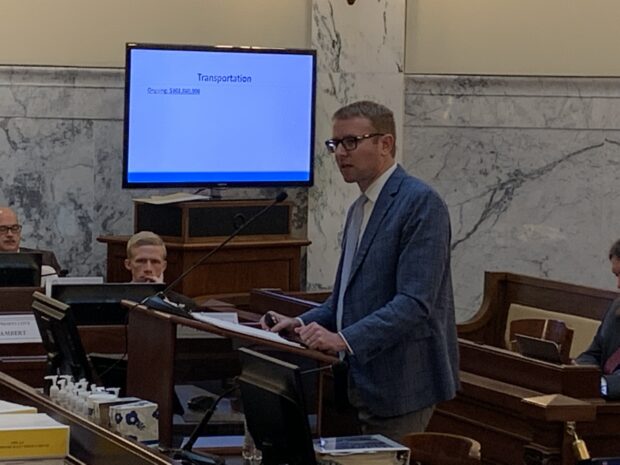House Education Committee members got a formal look at Gov. Brad Little’s education budget Tuesday morning.
This was the first time the committee discussed the budget since the Jan. 9 State of the State address, when Little proposed boosting teacher and school staff pay, creating a statewide scholarship program for graduating high school seniors and a host of other line items.
And lawmakers had plenty of questions for the governor’s office.
A few legislators focused on Little’s proposed Idaho Launch scholarship — an $80 million-a-year program to provide $8,500 scholarships to any high school graduate. The scholarships could be put toward two- or four-year degrees, career-technical certificates or workforce training programs.
The plan would be Idaho’s largest state-funded scholarship.

Rep. Lance Clow, R-Twin Falls, asked Alex Adams, Little’s budget chief, how the scholarship would be distributed over the two- to four-year period.
The governor’s office has a few ideas in the works, Adams said. The scholarships could be distributed like the Empowering Parents grants, where every recipient would get $8,500 loaded into an account to be redeemed at approved career training vendors. The governor has also discussed regulating the timeframe for students to use the scholarship.
The program would likely be overseen by the Workforce Development Council to prevent money from going into private institutions with no accountability, Adams said.
And if interest in the scholarships exceeds forecasts, he said, the state could prioritize students who plan to pursue training for in-demand careers.
Rep. Barbara Ehardt, R-Idaho Falls, asked Adams whether the scholarships would drive up tuition at the state’s universities and colleges.
“That certainly is an ongoing conversation,” he responded. Scaling back the scholarship to two-year programs could help prevent tuition hikes.
And Adams further clarified one of Little’s other proposals.
The governor’s proposed $6,300 increase in starting teacher pay would boost the other rungs of the career ladder too, Adams told Rep. Lori McCann, R-Lewiston.
Teachers at public charters and in juvenile detention centers would also see the lift.
But the governor’s proposals are just that — proposals. Any final policy decisions are up to the Legislature.
“The governor proposes, the Legislature disposes,” Adams reminded the committee.
Adams and Little policy adviser Matthew Reiber had been scheduled to speak to the Senate Education Committee Tuesday — but the presentation was pulled off the agenda about an hour before the committee’s 3 p.m. meeting. The move was the result of a scheduling conflict, said Madison Hardy, a spokeswoman for Little, and the presentation will be rescheduled.
National researcher paints a grim picture of charter schools facilities funding
Idaho is covering only a fraction of charter schools’ facilities needs — and the gap could only get wider.
The Senate and House education committees heard this grim assessment Tuesday from a researcher from a Tallahassee, Fla.-based education think tank.
Matthew Joseph, a senior policy adviser with ExcelinEd, studied charter school facilities funding in four states, including Idaho.
Idaho funds about 30% of charter school facilities needs — leaving a gap of about $27.9 million, or $1,250 per student. But as the charter sector continues to grow, the state’s facilities funding won’t keep up. By 2026-27, Joseph projects Idaho’s current charter funding model will cover only 23% of costs.
For the average charter school, that gap represents the cost of hiring and retaining 16 teachers.
Joseph suggested lawmakers build on a couple of steps they have already taken to fund charter facilities: beefing up a state-funded allowance that helps pay for facilities; and expanding a state financing guarantee that allows charter schools to borrow at lower interest rates.
Sen. Janie Ward-Engelking said she didn’t dispute Joseph’s findings. But she also pointed to a 2022 state report that spotlighted the building and maintenance backlog in Idaho’s traditional schools.
“I think the real issue is the state isn’t providing enough facility money for anybody, really,” said Ward-Engelking, D-Boise.
Last fall, a House-Senate working group studied options for putting more state money into school construction; committee members might propose legislation this year to address the issue. But unlike traditional school districts, charter schools cannot issue bonds for facilities.
Joseph conducted his research in concert with Bluum, an Idaho-based nonprofit supporting charter schools.
Some school property tax numbers, from Rev and Tax committee hearing
Schools collected nearly $600 million in property taxes in 2022 — although the overall cost of bond issues and supplemental levies declined slightly.
Continuing their review of property tax basics, the House Revenue and Taxation Committee Tuesday received a detailed briefing from the State Tax Commission.
A few key numbers from the Tax Commission, and property tax specialist Kathlynn Ireland:
- At $596.1 million, schools collected slightly more in property taxes than Idaho counties, and slightly less than Idaho cities.
- School property taxes increased only modestly from 2021, by $2.8 million, or 0.5%. Overall, property taxes statewide increased by 3.3%.
- At $217.5 million, supplemental levies made up the biggest chunk of this year’s school property taxes — although, as Idaho Education News reported in December, the statewide supplemental levy bill decreased slightly. Schools will receive $167.9 million in bonds, also down from the previous year.
While schools’ property tax collections were relatively stagnant, overall property values skyrocketed in 2022.
Statewide, assessed property values soared to $332.1 billion, an “incredible” increase of 43.7%, Ireland said.
And those spiraling property values are likely to fuel a lengthy debate over property taxes.
Little last week earmarked $120 million for property tax relief, but he did not spell out any specifics, deferring instead to lawmakers.
That means Rev and Tax could play a key role in shaping a property tax bill. All revenue bills must start in the House — namely, Rev and Tax.
The committee spent Monday and Tuesday discussing the mechanics of the property tax, but didn’t get into the specifics of what tax legislation might look like.
Bluum receives grant funding from the J.A. and Kathryn Albertson Family Foundation, which also funds Idaho Education News.
